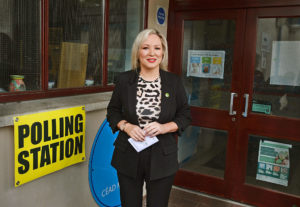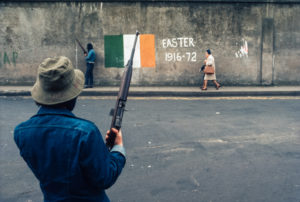A false narrative about Northern Ireland is in danger of becoming the accepted wisdom. If you believe the headlines, the United Kingdom is on the verge of breaking up. Scotland is on the brink of another referendum; Wales is wobbling; Northern Ireland, embroiled in the insoluble tangle of the Protocol, is looking again at the logic of Irish unity. September’s census revealed that Catholic numbers have overtaken Protestants in Northern Ireland; Sinn Féin will soon be in power on both sides of the Irish border. A United Ireland is now inevitable.
This couldn’t be further from the truth. Granted, opinion polls in Scotland show that voters there could favour independence in a referendum as early as autumn next year. However, Northern Ireland — geographically the furthest away of the UK’s wayward offspring — is likely to emerge from Britain’s ongoing political upheavals as the unloved child that clings with grim determination to its detached motherland.
Who, then, is to blame for this misleading narrative? Mary Lou McDonald, the leader of Sinn Féin, has called repeatedly for a border poll on the issue of a united Ireland. Tipped to be Ireland’s next Taoiseach, her success in the Republic of Ireland’s 2020 general election — in which her party won the popular vote — has brought the question of a referendum to the forefront of Irish politics.
Even so, a vote would be difficult to justify. Under the 1998 Good Friday Agreement, a plebiscite can be called at the discretion of the Secretary of State when he or she believes that “a majority of those voting would express a wish that Northern Ireland should cease to be part of the United Kingdom and form part of a united Ireland”. That day is unlikely to come soon: an overwhelming majority of opinion polls in Northern Ireland suggest that a referendum proposing a united Ireland today would be decisively defeated.
That there are now more Catholics than Protestants in the region won’t tip the balance. The old sectarian assumption that all Catholics would vote to end the border was discredited long ago: many Catholics are prospering in Northern Ireland and, for now, wish to retain the status quo. They may hold traditional, even tribal, views on the border, but the peace dividend — the improved economy — has benefited them.
McDonald senses hesitation from nationalists on both sides of the border, and has toned down her rhetoric as a result. After the 2020 election, she called for an urgent referendum from the British government. But her demands have since become more nuanced. At Sinn Féin’s recent Ard Fheis (annual conference) in Dublin earlier this month, she more modestly requested a “Citizens’ Assembly on Unity”. Now is the time, she bellowed, “to plan for constitutional change”. It was hardly a radical message: Citizens’ Assemblies are a handy way to delay decisions on politically-explosive issues. Her plan for the time being is to kick the holy grail down the road.
Not only is McDonald dampening republican ambitions, but her conference speech had none of the inflammatory language of the past. Speaking to an audience that included many IRA veterans, including her predecessor Gerry Adams, she was remarkably restrained. For the first time in recent history, she failed to invoke the names of republican war heroes like Adams himself or the late IRA chief-of-staff Martin McGuinness, a time-honoured device guaranteed to set the all-Ireland crowd alight. The IRA rallying cry, “Tiocfaidh ár lá” — (Our Day will come) was noticeably absent.
McDonald knows that her electoral successes, in both North and South, are not due to her championing the cause of a border poll. The border issue, while firing up true believers, spooks many citizens in both jurisdictions: no advocate has ever convincingly explained how the economy or the health service will benefit from a united Ireland. Instead, McDonald’s live televised speech at conference, pitched to the people of Ireland, emphasised the chronic housing needs of Ireland’s youth, the cost-of-living crisis, and the continued health crisis. Similarly, in May’s Northern Ireland election, there was a shift away from the republican battle cries about the border towards identical bread-and-butter topics.
This suits McDonald just fine. Today, she wants conversation, not conflict: which a border poll would inevitably bring. Her plan is to keep the issue on the boil, but not to force it to a premature finale; to persuade Sinn Féin’s republican base that they are marching on the road to paradise, but not enough to scare off potential supporters with other priorities. The border poll is political titillation with consummation postponed.
McDonald’s greatest achievement has been to rid Sinn Féin of its pariah status and bring it into the political mainstream. Her tireless populism has almost eliminated rival opposition parties in the Republic, while sidelining the other nationalist flag bearer — the Social Democratic and Labour Party (SDLP) — in Northern Ireland. Although she never wore a balaclava, McDonald’s endless lip service to the “armed struggle” and “the patriot dead” reassured the IRA veterans during her charm offensive on the South. She has managed to persuade an initially-sceptical southern electorate that she is a modern constitutional reformer without paramilitary baggage — all the while maintaining the trust of Sinn Féin’s northern hardliners, who see her as their best hope for a united Ireland.
McDonald is poised to gain power in both parts of Ireland; becoming Taoiseach is now almost a fait accompli. The next step is harder. She has understandably courted popularity by haranguing and harassing unionists and the British government, by skilfully painting them as intransigent villains of the piece. She picks her enemies carefully: convenient targets to unite her cocktail of followers.
However, McDonald, the master of the polemic, will soon be forced to adopt the politics of persuasion. Her victory in establishing Sinn Féin as the most powerful party on the entire island will be seen as an existential threat by those whom she has vilified. It will be hard for her suddenly to play the role of unifier: she is unlikely to be seen as a healing force.
With that in mind, expect the border poll to be mentioned frequently, but in a more muted voice. It will remain on the agenda: a useful symbol to dangle, a declaration of intent. But the reality is that few politicians holding significant political positions in Westminster or Leinster House want a border poll. It is a phantom political battleground. Far from providing a democratic decision, a referendum on the sectarian issue that has divided Northern Ireland since its foundation could mark the return of the old antagonists to the streets of Belfast and Derry; and to restore ebbing enmities in South Armagh and other border areas. No one wants that.
Disclaimer
Some of the posts we share are controversial and we do not necessarily agree with them in the whole extend. Sometimes we agree with the content or part of it but we do not agree with the narration or language. Nevertheless we find them somehow interesting, valuable and/or informative or we share them, because we strongly believe in freedom of speech, free press and journalism. We strongly encourage you to have a critical approach to all the content, do your own research and analysis to build your own opinion.
We would be glad to have your feedback.
Source: UnHerd Read the original article here: https://unherd.com/




